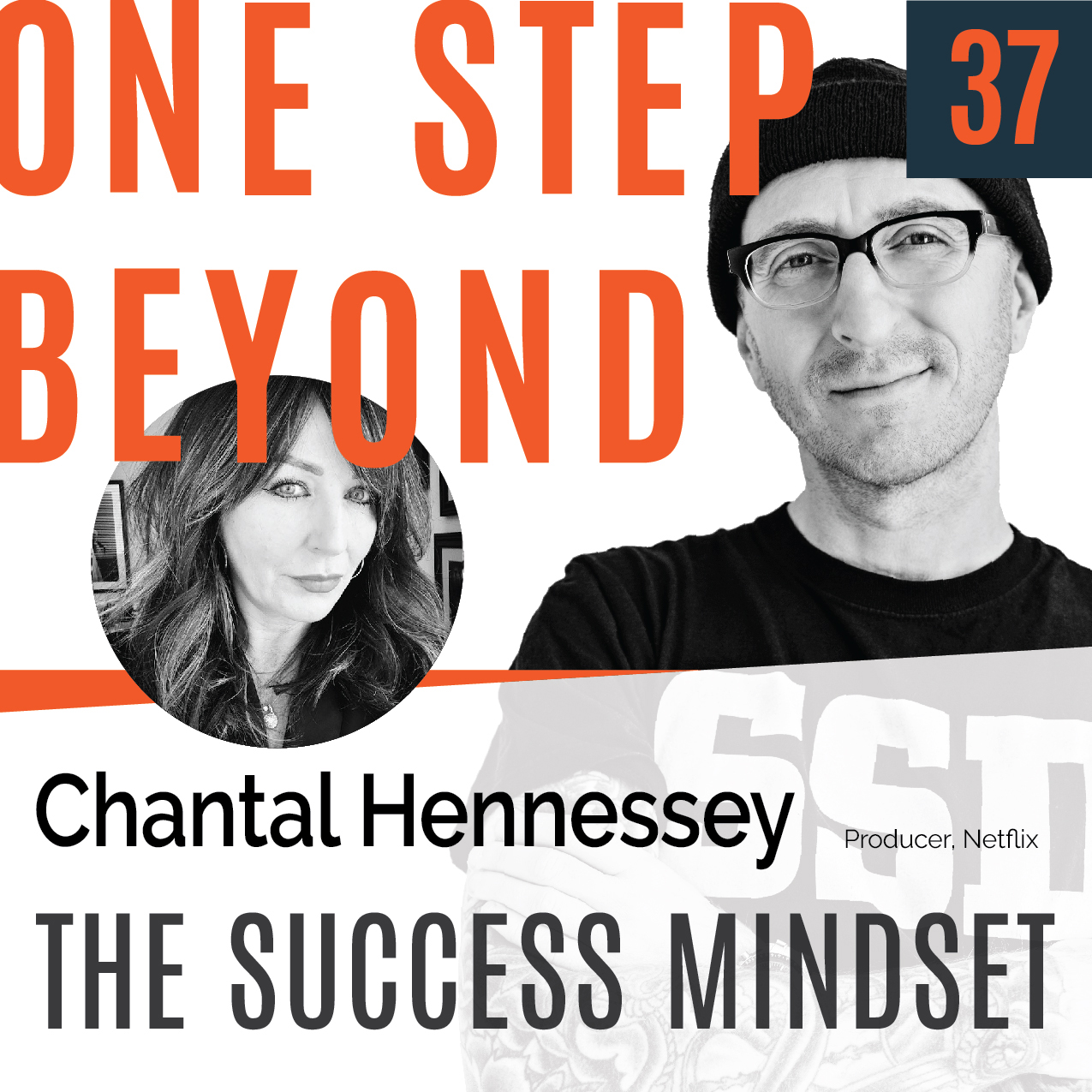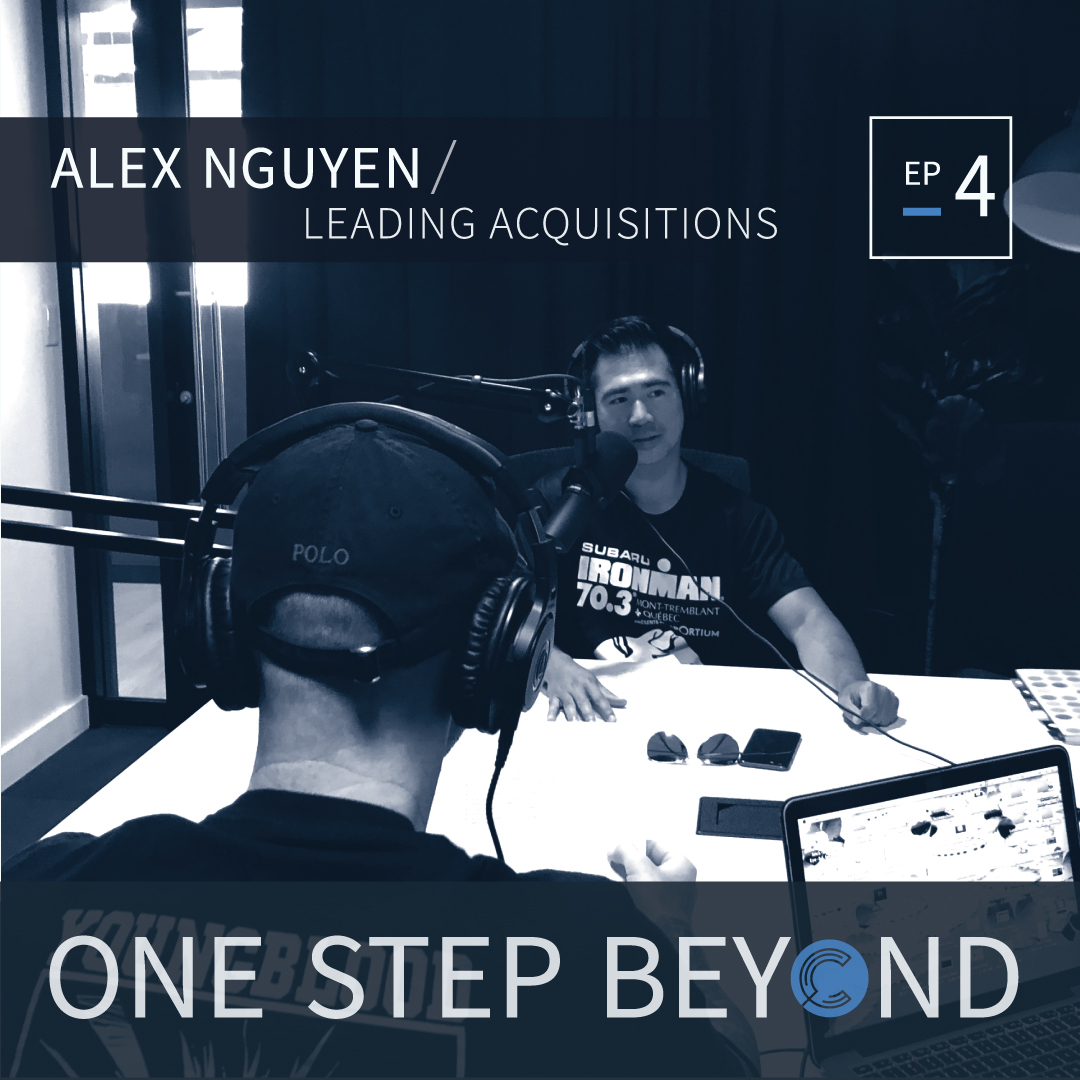Episode Transcript
[00:00:02] Speaker A: Hey everyone. Welcome to the episode. So Ask a RAM flips the script one step beyond Podcast Guests and listeners submit their questions and Ask a Ram anything. Questions can be music, life stories, business, leadership advice, how to make the best vegan omelette. You name it, a RAM will unpack your questions and leave you with info you can apply. Before we get to it, please rate, review and subscribe I love making New Year's resolutions, even though I struggle to stick with them. What can I do to improve the likelihood of achieving my goals?
[00:00:38] Speaker B: Make them small and measurable. Very often when people talk about goal setting, they set up these ideas of perfection or extinction. So either I'm going to start doing something and I'm going to be totally consistent and be perfect at it, or there's this thing I want to change and so I'm going to stop doing that and never happen again. So when it comes from, like, behavior change, the idea of perfection or extinction means that you're basically white knuckling something, trying to, like, make it a constant. Either constantly it goes away or constantly you're going to do it. And that's just not really like a practical way of change. Instead, you always want to think about doing an increase of frequency, duration, and impact, or a reduction of frequency, duration, and impact. That means for any behavior you want to increase, you want to be doing it more often. And then the times that you are doing it, you want the length of time to expand. And then logically, then the impact is going to expand. For any behavior you want to do less, then you just do it less often. And when you find yourself doing it, you catch yourself quicker and you shorten up the time. And as a result, the impact will be more. But the goal here isn't to get to 100% on. Either way, something's 100% perfect or 100% extinct. Instead, you want to scale up. And if you think about doing a behavior on average around 70% of the time consistently. So just like if you average it out in a month, could I keep up this behavior about 70% of the month? That should be the starting point. Then you scale from there. It's like you want to go to from 70 to 72 to 78 to 80, da da da. But know that most behaviors aren't going to be 100% of the time, and most behaviors aren't totally healthy to do 100% of the time either. Some are, but not all of them. So again, move away from perfection or extinction and focus more on things that are measurable and simple within starting at an average of around 70% of the the time.
[00:02:21] Speaker A: Every year I say new year, new me, but every year I end up tapped out long before my summer holiday. How do I avoid burnout?
[00:02:30] Speaker B: The key to avoiding burnout is maintaining what we call the legs of the chair. So that's focusing on exercise, diet, sleep and social. Those four things, specifically sleep, are going to be the things that keep you from getting tapped out. So I'll expand on that a little bit. There are three stages of burnout. Mild, moderate and severe. At each one of those stages, there's one of the P's goes. And so the first P that goes is patterns, patterns of self care. The second P that goes is performance. So that would be in moderate and then in severe is personality. Focusing just on your question, you're talking about mild burnout that might lead to moderate burnout. So the first P that would slip would be the patterns of self care. And that would be what we call the legs of the chair. It's about maintaining a strong regiment of exercise, diet, sleep and social life. And when I say strong regiment, I'm not asking you to start running marathons. It's actually quite the opposite. Just figure out what is the, the the state of activity that you're at your healthiest with that you can maintain for the longest and focus on maintaining that you know you're starting to get mildly burnt out when your patterns to self care start to slip. So for example, for some people who exercise relatively regularly and it's part of their self care, if they have a break in working out that's more than two weeks, that's a good sign that you are starting to get mildly burnt out. So a break of one week or even two weeks is relatively normal. When people have different changes, which could also include vacation, but anything longer than that, something that's part of your patterns of self care, if it slips for more than a two week period, it's a real indicator. So when we think about the legs of the chair, think of it this way. If a chair has four legs, you can sit in it comfortably. And that sitting in it comfortably is basically taking care of yourself, both your physical and mental health. But if one of the legs slips. So for example, of those four that I mentioned, exercise, diet, sleep and social, if one of them slips for more than two weeks, imagine a chair that only has three legs. You can sit in a chair that only has three legs, but it requires you start activating your core. So it's like more effort, which means you're taking care of yourself a little bit less because you're trying to actually focus on staying stable. But if two of those legs go. So for example, if diet and exercise are both gone and the two tend to be linked, that means your chair only has two legs. Can you sit in a chair with two legs? Well, you can, but it requires that you then start using your two legs plus your core to stabilize to sit in the chair. And it almost has no benefit to you because you're focusing so hard on being stabilized that you're not really getting a recuperative benefit from it. And if one more leg goes, so let's say in the situation sleep, then now you only have one leg left of the chair and there's no point even trying to sit in it.
If you keep those legs relatively intact, you should be able to get throughout the year and keep for that new year new you. But it really does take that kind of effort. And that kind of effort really starts with what's the combination of things that I need to be doing in those four categories that keep me at my best?
[00:05:34] Speaker A: I struggle with setting goals for my team. I seem to either make them too easy or too hard. How can I create goals for my team that are both motivating and achievable?
[00:05:44] Speaker B: You've got to have a two year vision and tie yearly goals to your two year vision. So what I mean by that is teams should always understand what their working alliance is, so who they are as a team and how that team's going to work together. They should also understand what their mission is, the purpose that that team exists. So why this group of people at this time in the business? Mission is different than function. Function is the most basic function of your group that if you didn't do that, if you weren't executing on that thing, your team would essentially be dysfunctional. What's the function of your team? Your mission is different. Your mission is why these people now at this time in the business. And then your two year vision and your four year vision come from that mission. So if you have, if you know what your mission is, then you should be able to say, okay, within two years we're going to do this and then within four years we're going to do this. So your goals should always be tied to a two year vision. And that two year vision should be stuff that's like super practical and measurable. When you have that, you're not just pitching ideas into a void like oh, let's do this or let's do that. It's always leaning back to, well, what's our mission? Our mission is the purpose of the team and the two year vision is about executing on that and moving it forward in a meaningful way within two years. So if you do that, you should always have a two year Runway of really clear goals that you can set for your team and they should be measurable.
[00:07:07] Speaker A: After the holidays, my business unit is jumping back into a complex project that's taken its toll. Two of my reports handed in their resignation before the break. And to top it off, I'm going on maternity leave in six weeks. How do I keep my team aligned and ensure our goals are achieved?
[00:07:25] Speaker B: Delegate and trust your team. If the team has been built and led well, they are going to be able to do this while shorthanded with two people not on the team and while you're on maternity leave because the team has been built to succeed. And delegation is this really kind of scary thing because you're demonstrating huge amount of trust, you're taking a leap of faith. But I gotta tell you that taking that leap of faith is what justifies people being so committed and passionate and in the mix. You're never gonna know what they're capable of unless you take that leap of faith and then they, they follow with you. So within that, this is a great opportunity for you to go on your mat leave and congratulations for that and really enjoy that time with your, with your family while also rewarding your team for all their hard work and passion by taking a leap of faith and letting them, letting them do it. That clear sign from their leader that you, that you trust them is going to be inspiration enough.
[00:08:23] Speaker A: I have a severe case of self doubt and I want to shake it. Any tips on how I can move past this?
[00:08:29] Speaker B: I suggest focusing less on getting rid of self doubt and more on making sure it's not debilitating. A lot of people carry great amounts of self doubt and it could go from very, very little to a huge amount.
And it's not so much about not having self doubt because that typically serves like a pretty practical thing for people psychologically. Instead it's about making sure that it's not debilitating. And that's the place where I'd encourage you to think about it is how debilitating is it. For many people, self doubt makes them have really strong perspective on what they're doing. They kind of like take a look at where I've been successful before and then they apply that model to what they're doing and then they Basically have to talk themselves through the step of if I've been able to do this before, I should be able to do it here. But that self doubt causes you to not just rest on your laurels and instead you're really like, kind of like scaling out. Is this applicable here? What new skills do I need to do? I need to learn? What do I need to think through? And a healthy dose of self doubt can really help people keep their approach sharp, thoughtful, and that again, they're not just resting on their laurels. So if that's what self doubt is doing for you, that's fantastic and you shouldn't get rid of it. However, if self doubt is debilitating, that's where I'd encourage you to think about it. And that really is a personal journey. So what I encourage you to think about. Is self doubt keeping you from taking opportunities? If so, is self doubt causing you to play small? Is self doubt causing you to undermine yourself? Is self doubt causing you to sell yourself short or to not proclaim all the great things about yourself and take on new, new opportunities? That's where I'd really encourage you to be thinking about it. So the idea again isn't about getting rid of self doubt, it's about really getting a strong idea of whether or not it's been debilitating or if it's dimming your shine. And if that's the case, then the work there is about moving away from the debilitating side, which is a totally different question. But self doubt in and of itself is actually quite a useful tool for almost anyone because it's about how you use self doubt to really make sure you're bringing your best self to any situation.
[00:10:41] Speaker A: What's the most important thing that sets your day in the right trajectory?
[00:10:45] Speaker B: I always start the day thinking about how I want to feel. When I finish and when I understand what that looks like, it's easy for me to take the steps to make that happen throughout the day. So this is what I mean by that. I start the morning every day with my wife. We have coffee together and we just kind of chat in the morning. And I always, during that time we talk about like what meetings I'm having, you know, like what's going on in the business, like what we've got going on, on for the rest of the day. And I know when I wrap up my workday is where I get to like start hanging out with my wife again, start hanging out with our kids again, start doing other stuff. And I know how I want to feel. I want to feel that even if I've had a tough day that I've got enough energy, I've got the right mindset, that I'm not distracted by work. So I really just set that intention about how I want to enter the next part of my day and it really helps me like govern my attention, know how much effort and time I have to put on things so that I'm fresh and ready to go for the rest of the day. And having an intention and setting it every single morning is something that keeps me from being like totally distracted or irritated with like something that happened at work or feeling down about not getting a certain opportunity. I can compartmentalize those and keep them in my workday because I've already set how I want to be entering the next part of my day.
[00:12:07] Speaker A: We want to hear from you, our audience, to submit your questions, send us a message, drop us a DM or comment on our social channels.


